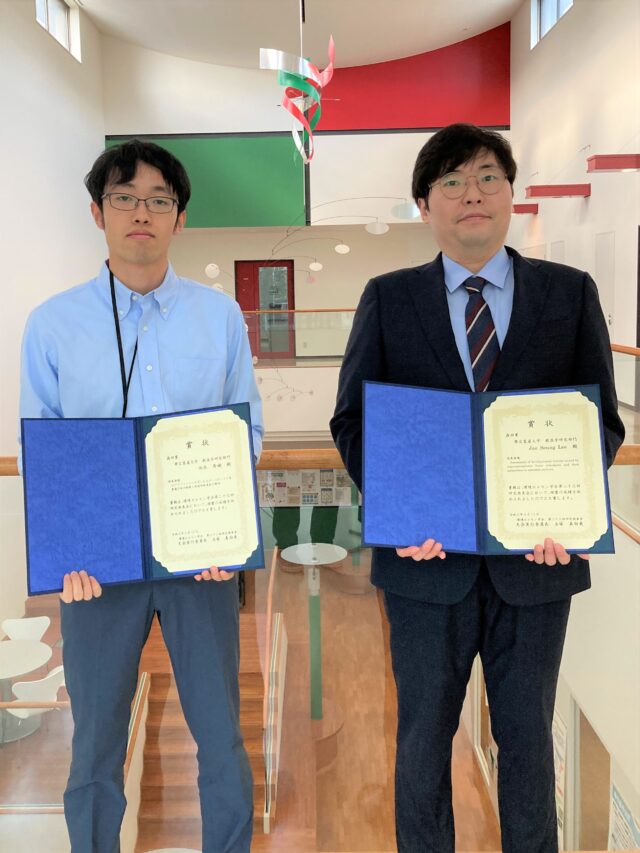Mr. Jae Seung Lee, a second-year student in the Doctoral Program of Animal Science and Agriculture at the Graduate School of Animal and Veterinary Sciences and Agriculture, and Mr. Hideki Ikemoto, a second-year student in the Master’s Program of Animal Science and Agriculture at the same graduate school, received the Morita Award for making an excellent oral presentation at the 23rd Annual Meeting of the Japan Society of Endocrine Disrupters Research [Executive Committee Chair: Professor Mayumi Ishizuka (Hokkaido University)], which was held online on September 12 (Sun.) and 13 (Mon.). The Japan Society of Endocrine Disrupters Research was established in 1998 as a place for exchanging information and presenting results on research on endocrine disrupters (environmental hormone).
Mr. Lee’s presentation subject was “Assessment of developmental toxicity caused by organophosphorus flame retardants and their metabolites in zebrafish embryos.” Mr. Lee has been conducting toxicity assessments and studies on the mechanism of action of trialkyl phosphates, which are flame-retardant plasticizers used in products, with the zebrafish as an animal model. Mr. Lee also received the Young Researcher Award at the online research presentation meeting of the Japanese Society of Environmental Toxicology in March 2021. The presentation this time showed further advanced bioinformatics analysis and that oxidative stress and the disruption of glycoprotein metabolism may be involved in the toxicity of trialkyl phosphates to circulatory organs. It also showed that the lipophilicity of compounds is important as a physicochemical property that contributes to the development of the cardiovascular toxicity of these compounds by newly incorporating machine learning technology.
Mr. Lee expressed his delight, saying “I am very honored to receive this award following the award at the meeting in March. I am deeply grateful to Professor Kubota, Professor Kawai, and other teachers and related parties for their instruction and assistance. I’ll continue to devote myself to research and make efforts to contribute to the field of toxicity.”
Mr. Ikemoto’s presentation title was “Elucidation of the disposition and developmental neurotoxicity of neonicotinoids using zebrafish.” Neonicotinoids (NNs) are widely used worldwide as they act selectively on nicotinic acetylcholine receptors in insects and are very safe for vertebrates, while the effects of exposure to a sublethal dose of NNs on the nervous system of non-target organisms are considered problematic. For example, NNs are considered to be one of the causes of colony collapse disorder that has occurred in Europe since the 2000s. Recent studies have reported that oral administration below NOAEL causes anxiety-like behavior in adult mice. In addition, NNs and their metabolites have been detected in the urine of humans, including newborns, which is thought to be caused by crop intake, and there are concerns about the developmental neurotoxicity caused by low concentrations of NNs. Mr. Ikemoto’s presentation this time clarified that compounds of acetamiprid and imidacloprid, which are typical NNs, and their metabolites tend to migrate to and accumulate in the brain by intraperitoneal administration to adult zebrafish. Referencing a behavioral test using fry, it also clarified that at low concentrations NNs cause behavioral disorders, such as anxiety. The results of this research are expected to advance the mechanism research, which is the greatest advantage of using zebrafish as a model animal.
Mr. Ikemoto expressed his delight, saying “I am very honored to receive such a wonderful award. I am deeply grateful to Professor Kubota, Professor Kawai, and other teachers for their instruction and assistance, as well as members of the Laboratory of Toxicology. I’ll continue to devote myself to research.”





